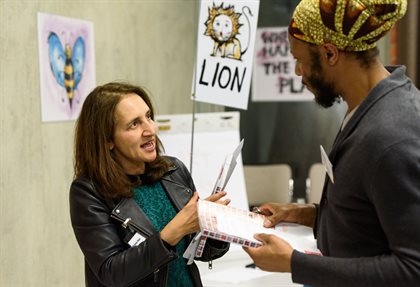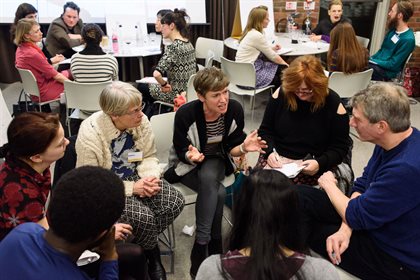Arts in Mind Innovation Scheme
Building on the success of the Arts, health & wellbeing programme that was developed at King's in collaboration with Breathe Arts Health Research throughout 2016 and explored how the arts can enhance health and wellbeing in clinical and care settings, the university is developing a new programme of collaborative opportunities for academics from the Institute of Psychiatry, Psychology & Neuroscience (IoPPN) at King's.
To celebrate the 20th anniversary of the IoPPN joining King’s College London, the Arts in mind innovation scheme brings together academics from the IoPPN with artists and arts organisations to develop innovative new conversations and collaborations.
The programme:
- Connects IoPPN researchers with artists working in shared intellectual spaces
- Supports the design and development of new collaborations between academics and artists
- Seed-funds innovative proof-of-concept projects that test new ways of enhancing understanding of mental health, the mind and the brain through the arts
 No previous experience or engagement with the arts is necessary; the scheme is open to all. The more curious and eager the participants are to understand, learn and break new ground, the better. As an indicator of what’s possible, academics across the King's Health Faculties have previously collaborated with a wide range of artists, including fashion designers, filmmakers, theatre groups, visual artists, dancers and choreographers, textile artists and sound artists.
No previous experience or engagement with the arts is necessary; the scheme is open to all. The more curious and eager the participants are to understand, learn and break new ground, the better. As an indicator of what’s possible, academics across the King's Health Faculties have previously collaborated with a wide range of artists, including fashion designers, filmmakers, theatre groups, visual artists, dancers and choreographers, textile artists and sound artists.
Together, academic / artistic collaborators have addressed a range of topics, including the experience of psychosis, post-natal depression, mental health in nursing staff, resilient thinking in health practitioners and children, attaining MRI scans of young or vulnerative patients, oral health, patients' experiences of the hospital environment and how to better cope with long-term medical conditions such as Rheumatoid Arthritis or Chronic Obstructive Pulmonary Disease.
Those who are interested can get a sense of the broad scope of previous collaborations by exploring the Arts, health & wellbeing page, where you will find links to current arts & health projects.
Arts in mind Open Space
To support applications to the scheme, the IoPPN and Cultural Institute at King's held an Open Space event on Thursday 2 March 2017 at the ORTUS learning & events centre.
This provided:
- An opportunity for academics to share their research interests with artists from a diverse range of disciplines.
- A facilitated environment for collaborative ideas generation.
- A relaxed and informal space to meet new people and share ideas over food and drinks.

Over 70 delegates attended and the workshop received positive feedback from both academics and artists. The event was followed by an Ideas Lab on 21 March 2017 to facilitate the collaborative project development process. The Ideas Lab was attended by 20 delegates in project groups.
Following the Ideas Lab, seed-funding was awarded to the best proof of concept ideas that subsequently emerged.
Eight projects are now underway:
- The creative arts hub Zimbabwe, led by Dr Melanie Abas, Department of Health Services & Population Research (Institute of Psychiatry, Psychology & Neuroscience) with Tariro Chaniwa, Magitare Trust.
The Creative Arts Hub is a novel 6-session group in Harare for adolescents recently diagnosed with HIV who also have depression. Through creative activities (music, drama, art, poetry, dance), self-expression and sharing of experiences, the project aims to improve psychological wellbeing, increase self-efficacy, and motivate to engage with HIV care.
- Headtrip, led by Professor Ricardo Araya, Department of Health Services & Population Research (Institute of Psychiatry, Psychology & Neuroscience) with Rebecca Hatchett, S.I.D.E Projects.
The project uses the power and intimacy of audio to create an immersive experience of depression, to explore whether creative audio can help reduce stigma and increase empathy amongst those most likely to encounter the condition.
- Losing one's sense of self: exploring the effects of frontal lobe brain damage, led by Dr Gerald Finnerty, Department of Basic & Clinical Neuroscience (Institute of Psychiatry, Psychology & Neuroscience) with Isla Millar and Iris Musel, Limbic Productions.
The project aims to explore how frontal lobe damage affects an individual's personal identity and social interactions which together constitute a person's sense of self.
- Maternal journal, led by Professor Carmine Pariante, Department of Psychological Medicine (Institute of Psychiatry, Psychology & Neuroscience) with Laura Godfrey-Isaacs.
The project builds on the tradition of women’s diary and journal keeping as a vital, expressive, creative and therapeutic practice by working with a group of pregnant women, who have a history of mild to moderate depression and/or anxiety.
- DIE OR RUN: Policy, anxiety & stigma, led by Dr Colette Hirsch, Department of Psychology (Institute of Psychiatry, Psychology & Neuroscience) with Hannah Ringham and Glen Neath.
Looking at patterns of general worry, social anxiety, current and inherited political policy, a provocative and entertaining performance will stimulate reactions on the impact social policy can have on mental health.
- Sound mind, led by Dr Sally Marlow, Department of Addictions (Institute of Psychiatry, Psychology & Neuroscience) with Christina McMaster.
The project explores the use of music and psychedelic images as mood enhancers by hosting two interactive concerts with audiences lying down and listening to selected compositions whilst experiencing psychedelic visual projections.
- Talking heads, led by Professor Sukhwinder Shergill, Department of Psychosis Studies (Institute of Psychiatry, Psychology & Neuroscience) with Mel Brimfield.
The project will develop an ambitious series of binaural audio monologue artworks that explore auditory hallucinations frequently associated with schizophrenia and psychosis.
- The cerebral city, led by Dr Eugenio Abela and Amber Collingwood, Department of Basic & Clinical Neuroscience (Institute of Psychiatry, Psychology & Neuroscience) with Matthew Maxwell.
The project will explore affinities between the structure of the brain and the landscape of the city by transposing data from tractographic scans of living human brains onto maps of the city of London.